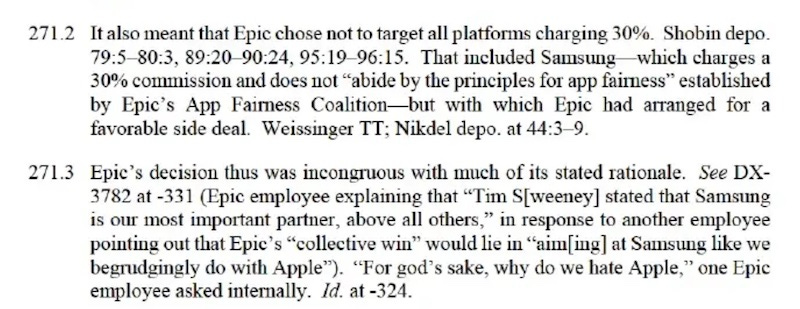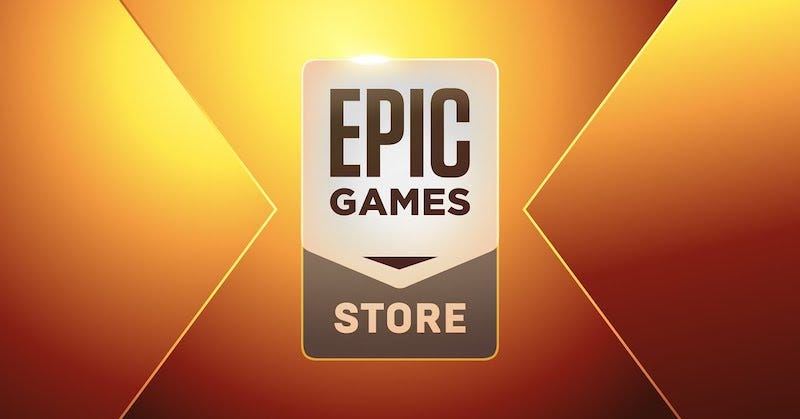Trending
Opinion: How will Project 2025 impact game developers?
The Heritage Foundation's manifesto for the possible next administration could do great harm to many, including large portions of the game development community.

Featured Blog | This community-written post highlights the best of what the game industry has to offer. Read more like it on the Game Developer Blogs or learn how to Submit Your Own Blog Post
We read all 700 pages of the 'Apple vs. Epic' lawsuit, so you didn't have to - here's some of the key takeaways for Epic's pitch against App Store monopoly.

[The GameDiscoverCo game discovery newsletter is written by ‘how people find your game’ expert & GameDiscoverCo founder Simon Carless, and is a regular look at how people discover and buy video games in the 2020s.]
Good morning/afternoon, fellow campers, and welcome to another fine week in ‘transmitting bytes across the Internet for video game leisure fun times’. And this entire newsletter is devoted to a lawsuit smackdown that we just can’t turn our heads away from, hurrah.

So, you’re probably aware of this whole ‘Epic taking on Apple, re: the App Store being the only way to buy games on iOS’ thing, right? Well, things are happening! So we thought it was worth going deeper into the mounds of paperwork that just got released to find deep nuggets of info.
As Reuters notes: “In a [U.S.] federal trial scheduled to begin May 3, the companies will fight over whether Apple’s 15% to 30% commissions for use of its in-app payment systems, and its longstanding practice of exercising control over which apps users can install, amount to anticompetitive behavior… Epic and Apple filed dueling position statements with the court on Thursday.”
And you too can read the court docs, which are comprehensive, to say the least. Here’s Apple’s filing (323 pages), and here’s Epic’s filing (365 pages). By the way, it’s a bench trial with a judge, so there will be no jury to convince.
Unfortunately, each side can demand redactions for confidentiality purposes. So quite a bit of juicy information is missing. Here’s my favorite redaction about Epic Games Store, from Apple’s filing (I presume related to this issue, but who knows?):

But there’s still plenty of good stuff in here. So let’s take you through it, and see what takeaways we have for the future of game/app platforms and exclusivity.
In general, Epic’s filing assails the pricing, methodology, and even the concept that iOS needs just the one App Store. Along the way, it suggests that Apple’s custodianship of the App Store is, well, subpar.
And it does as much as possible to make Apple seem shady, this being my favorite example (probably a mistake, but hey):

Overall, Epic’s lawyers claim up front: “Epic would launch the Epic Games Store on iOS if it could, but Apple will not allow it to do so. If the Epic Games Store were on iOS, it would provide consumers with the benefits of competition in iOS app distribution.”
But Apple hasn’t necessarily changed how it plans to operate iOS and App Stores in the last decade - except for adding the App Store Small Business Program in November, reducing commission to 15% for smaller devs. And honestly, it doesn’t seem to have many skeletons in its closet revealed during discovery or testimony, beyond the ‘we operate a walled garden, deal with it’ approach.
I also don’t buy a lot of the discussions over excess profit from the App Store as a big legal point - although Apple has forced a public redaction of the amount of money they do make. Apple’s reply claims its 2019 profits on ‘interlinked business lines’ of iPhone, iPad and App Store was 27%, and cheekily notes: “In 2019, Epic earned $1.83 billion in gross profits, resulting in an overall gross profit margin of 43%.” So in Apple’s view, Fortnite is more profitable than its hardware/software business, and Epic should shut up. (Maybe an ‘apples and oranges’ comparison?)
One of Epic’s best arguments - backed by proof of Apple execs getting involved to veto apps - is that the App Store being iOS-exclusive is a business decision, not a security decision: “The manual portion of Apple’s App Review process screens primarily for non-security issues - including specifically for anti-competitive purposes. For example, Apple has used the App Review process to reject competitive threats, even when the apps complied with Apple’s then-prevailing guidelines.”
In fact, it’s probably a bit of both. And this Epic claim doesn’t really hold water: “Apple’s App Review Process does little to keep iOS devices secure. It is cursory and has historically lagged behind the state of the art in terms of use of the automated tools needed for robust security checks.” It’s not perfect, but I do think iOS is a lot more secure because of Apple’s approach to security and a centralized store. YMMV.
There’s also a lot of expert Epic testimony about how competition in app stores (and alternative ways of billing IAP that didn’t run through Apple!) would cut down the 30% cut that Apple is currently charging, due to ‘competition’. And I do want to note here - Epic (and Tim Sweeney in particular!) are coming at this from an angle that platform cuts are too high, and should be lower across the board. That’s good for devs, and relatively altruistic, and we should genuinely appreciate that.
Overall, there’s a lot of ‘throwing the kitchen sink at Apple’ to prove they are a bad partner, and are operating a monopoly that needs to be legally acted upon. The question - which Apple gets to in its reply - is just how in the heck you’d do that.
So, Apple’s brief is a lot, lot juicier than Epic’s. This is mainly because the lawsuit’s discovery process allowed Apple to get to a lot of internal emails and discussions about the process of Epic’s loud and obnoxious ‘Project Liberty’ PR campaign.
But Apple starts with a simple ‘don’t hate us, we’ve always been like this’ pitch: “Apple has always maintained a “walled garden” approach to the distribution of native iOS apps created using Apple’s proprietary software… Apple has chosen to monetize the App Store by charging at most a 30% commission on paid apps and in-app purchases of digital content. Competing platforms charge the same or a higher commission.”
One hole in Epic’s logic on trying to reduce platform fees is the fact that Xbox, PlayStation, and Nintendo also charge 30% commission and only have one central ‘store’. This is an issue Epic tries to get around by saying that consoles are a ‘loss leader’, and should be treated differently. (Hm.)
In its filing, Apple suggests that the big mobile platforms are getting targeted for these lawsuits because they are a) uncooperative and b) a fraction of total Fortnite revenue, so safe to go after. Epic’s 2020 estimate was just 6.5% of Fortnite revenue via Android and Apple. And in fact, Apple says, other mobile phone app stores have just been ignored:

It’s definitely a hole in Epic’s argument that only a fraction of the platforms are being pursued here - particularly console. And it segues into the one trickiest bit of the argument for Apple - why is Epic even doing this in the first place? The answer Apple is pushing is that as part of “a pre-planned media strategy called Project Liberty… Epic seeks to portray Apple as the ‘bad guy’ so that it can revive flagging interest in Fortnite.”
According to Epic data that Apple accessed, between 2018 and 2019, Fortnite’s average monthly active users and revenues declined. And a new long-term plan around user-generated content needed to free up revenue cut by targeting platform fees:

Look, it may be a factor, but I don’t think a Roblox-ification of Fortnite is the main reason that Epic has gone after Apple (and Google). I think Epic’s CEO Tim Sweeney has an ideological issue with large platforms ‘overcharging’ for platform fees that he holds higher than his company’s commercial interests.
And, uh, more power to him? But that’s very difficult to explain in court. So that’s the best thing that Apple can come up with - and may indeed be used for internal Epic company justification too.
Returning to the key question - how would the courts even rule against Apple here? Apple’s lawyers say: “At bottom, Epic is asking this Court to force alternative terms on Apple so that Epic can make more money… Epic’s requested relief would require judicial supervision of a technical redesign of iOS and the App Store, along with technical support to ensure interoperability of third-party app stores on iOS.”
I agree that this seems unlikely, or at least impractical. And to conclude: absolutely, I think that game platforms should charge a smaller cut - and these lawsuits are more pressure on them to do so. But I don’t know that government intervention is a clean or easy way to force them to do so - or even that opening up to multiple App Stores makes a big difference to platform cut.
For example, despite much expense, it doesn’t seem like Epic Games Store on PC has (yet) put a lot of direct pressure on Steam’s customary 30% revenue cut. (Though Epic’s filing does claim the change Steam did make in 2018 was ‘curiously’ timed to Epic’s market entry.) Which brings us to…

What you’ve probably seen from these filings so far on ‘the Internet’ is information about how much money Epic Games Store on PC is losing.
It’s peripheral to the lawsuit, but for some reason, Epic’s lawyers didn’t ask for the EGS PC’s financial specifics to be redacted from Apple’s filings. (I’m pretty sure they could have, since Apple’s profitability on the App Store did get redacted.)
So we get juicy Apple statements like: “EGS is not profitable and will not be profitable for at least multiple years, if ever. .. Epic lost around $181 million on EGS in 2019... Epic is projected to lose around $273 million on EGS in 2020… Indeed, Epic committed $444 million in minimum guarantees for 2020 alone… Epic projects to lose around $139 million in 2021.”
Those ain’t small numbers! And following the headlines, Tim Sweeney has gone public on Twitter - presumably prompting calls from horrified Epic lawyers - saying: “It has proven to be a fantastic success in reaching gamers with great games and a fantastic investment into growing the business… Apple spins this as “losing money”, but spending now in order to build a great, profitable business in the future is exactly what investment is! It’s equally true whether you’re building a factory, a store, or a game.”
Uh, Tim, EGS is certainly ‘losing money’ right now, spin or no spin. But if you could see Apple’s costs for commissioning games for Apple Arcade, you would almost certainly see hundreds of million of dollars in initial losses - and the same for Google Stadia, of course. So for platform companies with lots of money, a loss-leading investment to build a business isn’t crazy.
Epic has made a much better run at Steam than anyone would have ever expected. But there are some signs of concern in here. For one, Apple reveals “the incentives and investments [Epic] has made in an attempt to grow EGS will result in ‘unrecouped costs’… that includes at least $330 million in unrecouped costs from minimum guarantees alone.”
And this is what I’ve heard, too - that a lot of EGS PC games are not selling nearly enough copies to make back the ‘guaranteed’ sales number. Maybe Epic would say that this was intended too - some of the guarantee is just a write-off to get people onto the platform. But I don’t personally think that EGS is trending to Epic’s medium-term revenue goals.
Epic has plenty of cushion - especially given its multi-billion dollar market valuation - to deal with this, of course. And though Apple reveals that Epic “does not expect EGS to have a cumulative gross profit before 2027”, with the rest of the business in fine fettle, it may not matter.
But if Epic can’t make a big dent in Steam’s numbers without constantly paying a lot of loss-leading money for exclusives, where would that leave its pitch that it should be running a store on iOS too? And what about the curiously slow rate of feature additions to EGS on PC?
Well, Apple has some views on that, too, haha. Firstly, they state baldly: “By its own admission, the Epic Games Store - two years after it launched - is still missing ‘critical’ features.” And they have fun digging out internal Epic emails suggesting that maybe EGS needs some community support of its own:

Finally, Apple sasses out Epic on this whole ‘Epic needs its own iOS app store’ pitch by just, well, bringing the shade:

Not sure this is fair at all, but it’s - you’ve got to admit - a little bit funny. Though it’s written by highly-paid lawyers of a gigantic corporation who I still don’t think care about video games that much. Probably not as much as Epic or Tim Sweeney does.
So this is a giant mess, and we’re back to the ‘who to root for?’ discussion again. And the answer is - I don’t know, there’s no ethical consumption under capitalism. But here’s what the company says, and we’ll see what the judge says. I don’t believe that Epic will prevail, but perhaps the stance was the point, not the result?
[We’re GameDiscoverCo, a new agency based around one simple issue: how do players find, buy and enjoy your premium PC or console game? You can subscribe to GameDiscoverCo Plus to get access to exclusive newsletters, interactive daily rankings of every unreleased Steam game, and lots more besides.]
Read more about:
Featured BlogsYou May Also Like